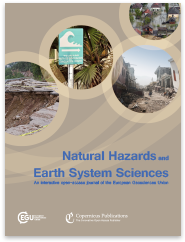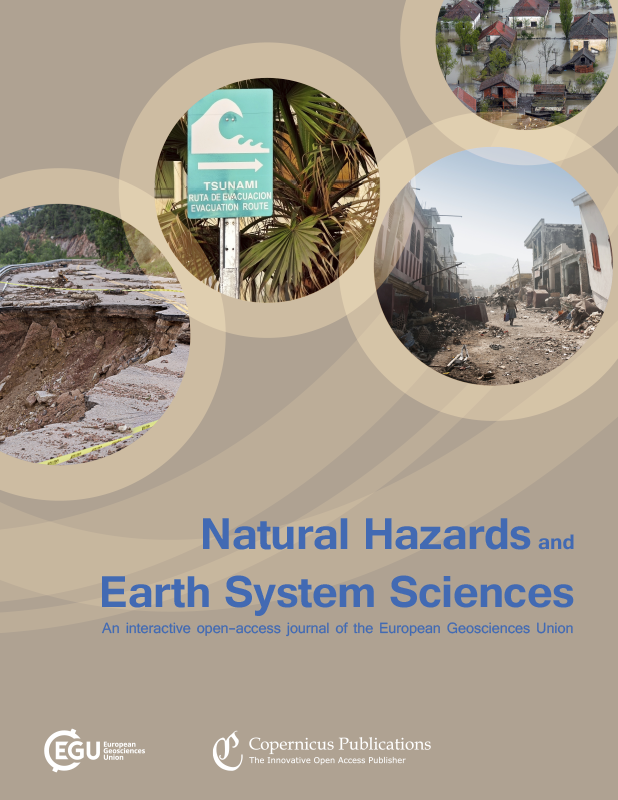Executive editors: Brunella Bonaccorso, Animesh Gain, Margreth Keiler, Gregor C. Leckebusch, Bruce D. Malamud, Paolo Tarolli & Uwe Ulbrich
eISSN: NHESS 1684-9981, NHESSD 2195-9269
Natural Hazards and Earth System Sciences (NHESS) is a not-for-profit interdisciplinary and international journal dedicated to the public discussion and open-access publication of high-quality studies and original research on natural hazards and their consequences. Embracing a holistic Earth system science approach, NHESS serves a wide and diverse community of research scientists, practitioners, and decision makers concerned with detection of natural hazards, monitoring and modelling, vulnerability and risk assessment, and the design and implementation of mitigation and adaptation strategies, including economical, societal, and educational aspects.
Journal metrics
NHESS is indexed in the Web of Science, Scopus, Google Scholar, etc. We refrain from displaying the journal metrics prominently on the landing page since citation metrics used in isolation do not describe importance, impact, or quality of a journal. However, these metrics can be found on the journal metrics page.
News
03 Dec 2025
New MS Word template available for manuscript preparation
The existing MS Word template for authors has been significantly expanded and now includes many important notes on the standard sections that must be included in the manuscript. Please visit the "Submission" page, section "Templates for your manuscript file" and download the new template before writing your next manuscript. 
03 Dec 2025
New MS Word template available for manuscript preparation
The existing MS Word template for authors has been significantly expanded and now includes many important notes on the standard sections that must be included in the manuscript. Please visit the "Submission" page, section "Templates for your manuscript file" and download the new template before writing your next manuscript. 
05 Mar 2026
Sequential approach to seismotectonic zonation for South-East France
Victoria Mowbray, Marguerite Mathey, Christian Sue, Stéphane Baize, Anne Lemoine, and Céline Beauval
EGUsphere, https://doi.org/10.5194/egusphere-2026-623,https://doi.org/10.5194/egusphere-2026-623, 2026
Preprint under review for NHESS (discussion: upcoming, 0 comments)
Short summary
04 Mar 2026
Changing drivers of regional large magnitude avalanche frequency throughout Colorado, USA
Erich H. Peitzsch, Justin T. Martin, Ethan M. Greene, Nicolas Eckert, Adrien Favillier, Jason Konigsberg, Nickolas Kichas, Daniel K. Stahle, Karl W. Birkeland, Kelly Elder, and Gregory T. Pederson
Nat. Hazards Earth Syst. Sci., 26, 1059–1074, https://doi.org/10.5194/nhess-26-1059-2026,https://doi.org/10.5194/nhess-26-1059-2026, 2026
Short summary
Highlight articles
03 Mar 2026
Advancing glacial lake hazard and risk assessment in Bhutan through hydrodynamic flood mapping and exposure analysis
Sonam Rinzin, Stuart Dunning, Rachel Joanne Carr, Simon Allen, Sonam Wangchuk, and Ashim Sattar
Nat. Hazards Earth Syst. Sci., 26, 1015–1037, https://doi.org/10.5194/nhess-26-1015-2026,https://doi.org/10.5194/nhess-26-1015-2026, 2026
Short summary
27 Feb 2026
Lessons learned in institutional preparedness and response during the 2022 European drought
Riccardo Biella, Anastasiya Shyrokaya, Ilias Pechlivanidis, Daniela Cid, Maria Carmen Llasat, Faranak Tootoonchi, Marthe Wens, Marleen Lam, Elin Stenfors, Samuel Sutanto, Elena Ridolfi, Serena Ceola, Pedro Alencar, Giuliano Di Baldassarre, Monica Ionita, Mariana Madruga de Brito, Scott J. McGrane, Benedetta Moccia, Viorica Nagavciuc, Fabio Russo, Svitlana Krakovska, Andrijana Todorovic, Patricia Trambauer, Raffaele Vignola, and Claudia Teutschbein
Nat. Hazards Earth Syst. Sci., 26, 955–979, https://doi.org/10.5194/nhess-26-955-2026,https://doi.org/10.5194/nhess-26-955-2026, 2026
Short summary

20 Feb 2026
Towards an operational European Drought Impacts Database (EDID)
Kerstin Stahl, Kathrin Szillat, Veit Blauhut, Monika Hlavsová, Lauro Rossi, Dario Masante, and Andrea Toreti
Nat. Hazards Earth Syst. Sci., 26, 845–861, https://doi.org/10.5194/nhess-26-845-2026,https://doi.org/10.5194/nhess-26-845-2026, 2026
Short summary
30 Jan 2026
Flood risks to the financial stability of residential mortgage borrowers: an integrated modeling approach
Kieran P. Fitzmaurice, Helena M. Garcia, Antonia Sebastian, Hope Thomson, Harrison B. Zeff, and Gregory W. Characklis
Nat. Hazards Earth Syst. Sci., 26, 675–701, https://doi.org/10.5194/nhess-26-675-2026,https://doi.org/10.5194/nhess-26-675-2026, 2026
Short summary
More highlight articles  All EGU highlight articles
All EGU highlight articles 
Notice on the current situation in Ukraine
To show our support for Ukraine, all fees for papers from authors (first or corresponding authors) affiliated to Ukrainian institutions are automatically waived, regardless if these papers are co-authored by scientists affiliated to Russian and/or Belarusian institutions. The only exception will be if the corresponding author or first contact (contractual partner of Copernicus) are from a Russian and/or Belarusian institution, in that case the APCs are not waived.
In accordance with current European restrictions, Copernicus Publications does not step into business relations with and issue APC-invoices (articles processing charges) to Russian and Belarusian institutions. The peer-review process and scientific exchange of our journals including preprint posting is not affected. However, these restrictions require that the first contact (contractual partner of Copernicus) has an affiliation and invoice address outside Russia or Belarus.




